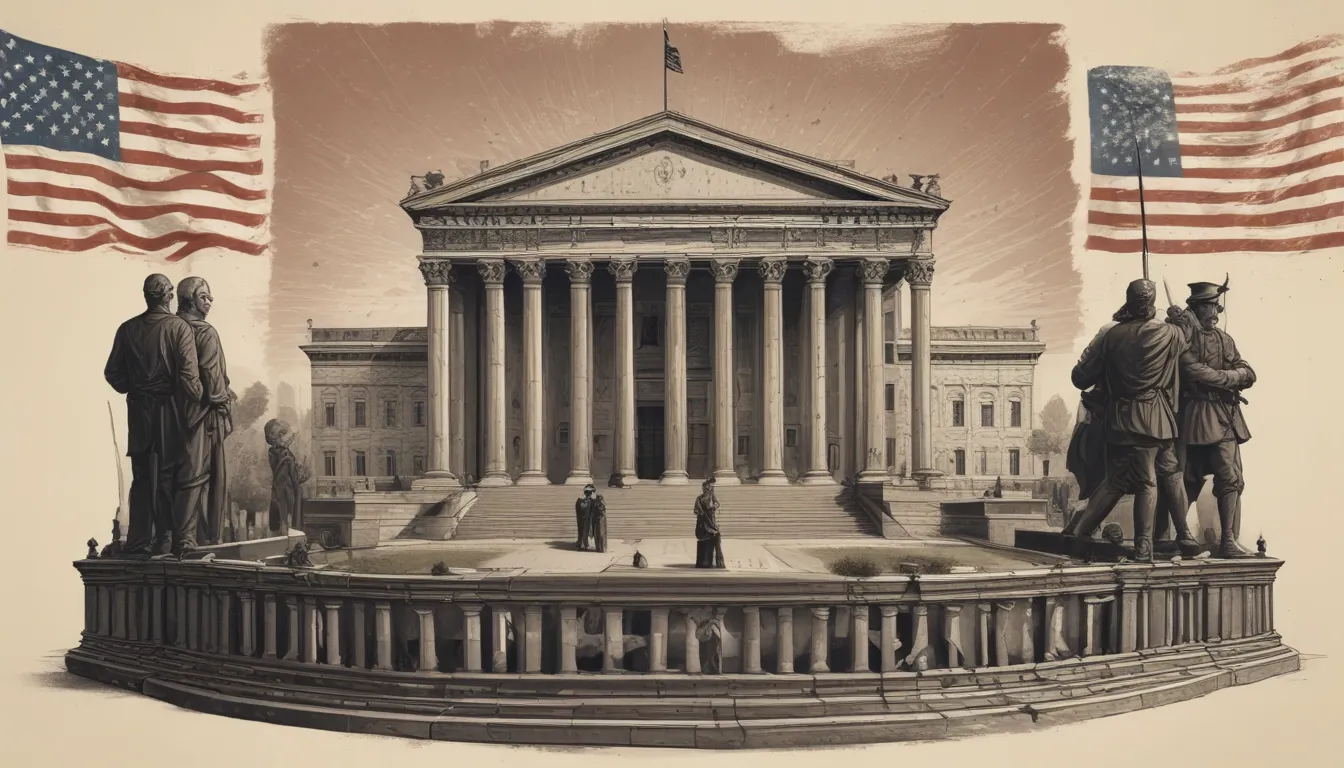The images in our articles may not match the content exactly. They are used to grab your attention, not to show the exact details in the text. The images complement the text but do not replace it.
In the realm of American legal rights, the 6th Amendment stands as a pillar of protection, ensuring fair trials for all individuals involved in criminal prosecutions. This crucial component of the United States Constitution guarantees defendants a myriad of rights, from a speedy and public trial to the opportunity to confront witnesses against them. The 6th Amendment serves as a safeguard against wrongful imprisonment and upholds the values of transparency and fairness in the legal process. Join us on a journey as we unveil 35 astonishing facts about the 6th Amendment, shedding light on its profound impact on justice and liberty. Get ready for a revelation!
Unveiling the Essence of the 6th Amendment
The 6th Amendment to the United States Constitution is a fundamental cornerstone of the Bill of Rights, enshrining vital rights pertaining to criminal proceedings. This pivotal amendment secures essential protections for criminal defendants, including the right to a speedy and public trial, the right to be informed of the nature and cause of the accusation, the right to confront witnesses, the right to obtain witnesses in their favor, and the right to legal counsel.
- Speedy Trial: Prevents indefinite detention and ensures timely resolution of cases.
- Public Trial: Promotes transparency by allowing public observation of court proceedings.
- Informed of Accusation: Guarantees the right to know the charges and evidence against oneself.
- Confronting Witnesses: Allows defendants to challenge and question those testifying against them.
- Compulsory Process: Enables defendants to secure witnesses beneficial to their defense.
- Right to Counsel: Ensures legal representation regardless of financial means.
Tracing the Historical Evolution of the 6th Amendment
The roots of the 6th Amendment can be traced back to the Magna Carta of 1215, which laid the groundwork for the concept of due process and individual rights. Subsequently, the English Bill of Rights in 1689 further developed the principles that would later influence American legal thought.
- Impact of Magna Carta: Paved the way for the rights enshrined in the 6th Amendment.
- Legacy of English Bill of Rights: Expanded on Magna Carta’s principles, shaping American legal traditions.
Embracing the 6th Amendment in Contemporary Legal Landscapes
In modern legal contexts, the 6th Amendment remains a vital protector of justice and liberty, guiding the conduct of criminal trials in the United States.
- Gideon v. Wainwright (1963): Landmark case expanding access to legal counsel for indigent defendants.
- Speedy Trial Act of 1974: Legislation enforcing time limits for federal criminal prosecutions under the 6th Amendment.
Distinctive Features of the 6th Amendment
While many countries uphold rights for criminal defendants, the 6th Amendment boasts unique provisions not found universally.
- Jury Selection: Emphasizes impartial juries through the voir dire process.
- Change of Venue: Allows defendants to request a trial relocation for impartial proceedings.
Global Impact of the 6th Amendment
The principles embedded in the 6th Amendment have transcended borders, influencing legal systems worldwide and fostering protections for the accused in various jurisdictions.
- International Human Rights: Acknowledged as a fundamental right under global frameworks like the Universal Declaration of Human Rights.
- Comparative Legal Studies: Scholars draw parallels between the 6th Amendment and international legal standards for criminal justice.
Navigating the Future of the 6th Amendment
In an era of technological advancements and evolving societal norms, the interpretation and application of the 6th Amendment face new challenges and opportunities.
- Digital Era Legal Challenges: Addressing issues such as social media influence on jury impartiality and privacy rights in electronic communications.
- Continual Legal Adaptation: Courts adapting interpretations of the 6th Amendment to resonate with contemporary realities.
- Public Access and Court Proceedings: Balancing transparency with privacy concerns in the age of electronic court records.
- Evolving Role of Legal Counsel: Recognizing the changing landscape of legal representation in the digital age.
- Diversity in Jury Selection: Ensuring diverse and unbiased juries in a rapidly changing society.
- Complexity of Modern Trials: Addressing logistical challenges in ensuring speedy trials amidst growing case complexities.
- Globalization and Legal Norms: Exploring cross-border implications of criminal prosecutions on 6th Amendment principles.
- Privacy Rights in Surveillance: Navigating the intersection of national security and individual privacy within 6th Amendment frameworks.
- Social Media Impact: Considering the influence of social platforms on legal proceedings and jury perception.
- Equal Access to Legal Aid: Addressing disparities in legal representation to uphold 6th Amendment rights.
- Youth Justice Considerations: Tailoring legal approaches for juvenile defendants under the 6th Amendment.
- Mental Health and Trial Competency: Addressing mental health challenges in ensuring fair trials.
- Forensic Evidence Standards: Evaluating the reliability of digital and forensic evidence under the 6th Amendment.
- International Extradition Challenges: Navigating jurisdictional complexities while upholding defendant rights.
- Language Barriers and Legal Proceedings: Overcoming communication barriers for non-English speaking defendants.
- Witness Protection Balancing Act: Safeguarding witnesses while upholding defendant’s rights to confront accusers.
- Alternative Dispute Resolution: Challenges surrounding mediation and 6th Amendment protections.
- Cybercrime and Legal Boundaries: Addressing unique challenges of cyber offenses within 6th Amendment frameworks.
- Forensics and Evidence Admissibility: Ensuring legality and reliability of forensic evidence under the 6th Amendment.
- Cross-Examination Artistry: Importance of robust cross-examination in legal defense strategies.
- Public Perception of Legal System: Building trust and credibility in the judicial process to uphold 6th Amendment principles.
Reflecting on the Legacy of the Sixth Amendment
A profound exploration of the Sixth Amendment reveals its indispensable role in safeguarding individual liberties within the American legal system. This constitutional cornerstone ensures that every individual facing criminal accusations receives a fair, efficient trial with the right to legal counsel if necessary. The Sixth Amendment not only shapes legal proceedings but also upholds the democratic values of fairness, transparency, and the right to defense. Its impact transcends courtroom boundaries, influencing societal perceptions of justice and legal administration across the nation.
Seeking Your Feedback
Our commitment to delivering accurate and engaging content drives our mission to empower readers with valuable insights. Every fact shared on our platform is contributed by individuals like you, fostering a diverse pool of knowledge and viewpoints. Rest assured, each submission undergoes rigorous review by our dedicated editors to uphold the highest standards of authenticity and credibility. Trust in our dedication to quality and authenticity as you delve into the realms of knowledge and discovery with us.






